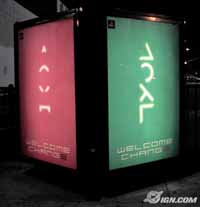PlayStation 3 compatibility with PlayStation 2 limited in Europe
The PlayStation 3 going on sale in Europe next month will play only some of the games for its predecessor video game machine a move designed to cut costs and speed up production.

Backward compatibility with PlayStation 2 has been billed as a major feature for the PlayStation 3 that went on sale late last year in the U.S. and Japan.
But packing the machine with two expensive computer chips to play both PS2 and upgrade PS3 games has been racking up costs for the money-losing PS3, a big reason behind Sony Corp.'s flagging earnings lately.
The European PlayStation 3, set to go on sale March 23, won't carry the chip for PlayStation 2 and will instead use special software to play PS2 games, saving costs and making mass production easier by reducing parts, Sony Computer Entertainment spokesman Daisuke Nakata said Wednesday, while refusing to say how much the move will save.
"The method used for playing PS2 games is going to be different," he said. "We also want to concentrate on developing PS3 games."
It's still undecided whether PS3 machines for Japan, U.S. and elsewhere will also be sold without the PS2 chip, but the option is being considered, Nakata said.
The U.S. and Japanese version PS3 machines had also failed to deliver full compatibility with PS2 games.
Almost as soon as PS3 went on sale in Japan and the U.S., Sony acknowledged it wasn't properly playing thousands of PS2 games, with some scenes freezing, the music not playing, or the game not working at all.
Sony has been offering downloads to fix the problem, but not all the problems have been fixed, according to Sony Computer Entertainment.
Downloads for the European PS3 will also be available for playing more PS2 games, but the number of PS2 games the machine will be able to play is still undecided as work is still ongoing to make as many games as possible playable, said Nakata.
The decision to forego the PS2 chip for the European model, announced Friday in Europe, is yet another blow to the PS3, plagued by production delays. The European launch was postponed until March from the initially promised Christmas.
The PS3 has also suffered a bit of an image problem against the spectacular hit of rival Wii home console from Nintendo Co., maker of the GameBoy Advance and Nintendo DS handheld machines, as well as Pokemon and Super Mario games.
Skeptics have noted Wii is out of stock while PS3 can be found on shelves. One drawback to PS3 is that at US$499 and US$599, it costs about twice as much as the Wii.
Although backward compatibility with PS2 would seem a small issue for its cutting-edge successor, there still aren't that many PS3 games on sale. A great deal of time is required to develop PS3 games, and attractive games are being promised for later this year.
Still, what is being perceived as PS3 problems is hurting Sony at a time when it is trying to achieve a turnaround, shedding unprofitable divisions and selling assets.
Sony's October-December profit slipped 5 percent to 160 billion yen (US$1.3 billion; EUR980 million), largely because of PS3 startup costs. The company has fallen behind rivals in recent years in key gadgets such as flat-panel TVs and portable music players, but it has been gradually boosting profits in its electronics operations, reports AP.
Sony has sold 1.8 million PS3, while Nintendo sold 3.2 million Wii machines worldwide by the end of last year.
Sony shares, which have been gradually recovering in the last three months, plunged 6 percent to 6,130 yen (US$51.90; EUR39.20) in Tokyo midday amid a broad market retreat.
Subscribe to Pravda.Ru Telegram channel, Facebook, RSS!


